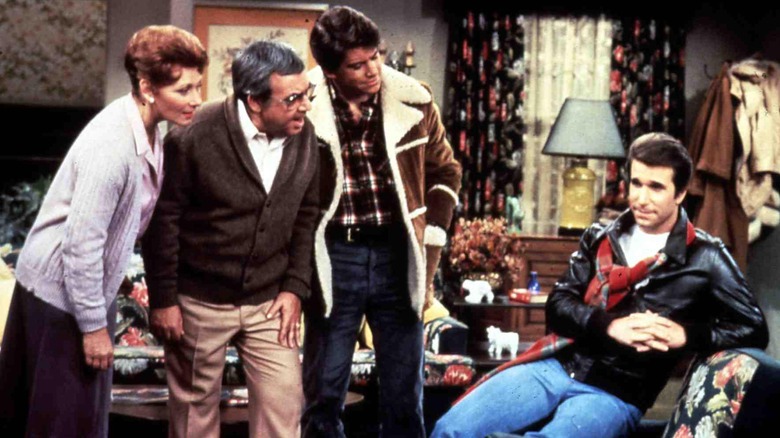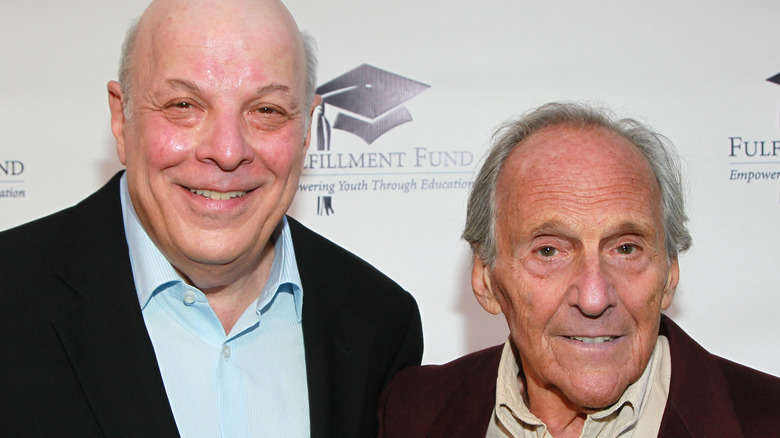The Story Behind The Happy Days Theme Song
Decades before "That '70s Show" awakened nostalgic feelings among younger Baby Boomers while proving surprisingly relatable to kids of the late '90s and early 2000s, "Happy Days" was doing the same for those who grew up in the '50s and were coming of age in the '70s and early '80s. For starters, the long-running sitcom introduced viewers to the Cunningham family of Milwaukee, Wisconsin — parents Howard (Tom Bosley) and Marion (Marion Ross) and children Richie (Ron Howard) and Joanie (Erin Moran). There was a third Cunningham sibling named Chuck, though after a few seasons of sporadic appearances, it was as if Howard and Marion's eldest child never existed. Oh, and who can forget the series' breakout character, the leather jacket-wearing, catchphrase-spouting Arthur "Fonzie/The Fonz" Fonzarelli (Henry Winkler). Aaaaaay!
Without a doubt, "Happy Days" made an indelible mark in pop culture in more ways than one. In 1994, would-be alternative rock icons Weezer tipped their hat to the show, as the video for their song "Buddy Holly" featured the band performing at Al's Diner, with Al Molinaro reprising his "Happy Days" role as the diner's owner, Al Delvecchio. The Fonz has been referenced in various television shows through the years. And the series' theme song, with its hook-laden simplicity, is still fondly remembered to this day. It also has quite a fascinating story to it, starting with how it was written by two men who composed their share of '70s classics.
The theme was composed by two hitmaking songwriters
As you can probably expect from a sitcom theme song recorded in the 1970s, the "Happy Days" theme was composed by two established songwriters, Norman Gimbel and Charles Fox — that's the two of them pictured above, with Fox on the left and Gimbel on the right. Although Gimbel was already well into middle age at the time, he and Fox were responsible for co-writing a number of big 1970s pop hits, including Roberta Flack's "Killing Me Softly with His Song" and Jim Croce's "I Got a Name," as noted by the Chicago Tribune. The former song earned the duo a Grammy Award for song of the year in 1973, and those who grew up in the '90s certainly remember the Fugees' version of "Killing Me Softly," which was similarly huge in 1996. Gimbel also won a best original song Oscar for co-writing Jennifer Warnes' "It Goes Like It Goes," from the 1979 film "Norma Rae."
Considering the above accomplishments, as well as the fact that Gimbel wrote the English lyrics to the bossa nova classic "The Girl from Ipanema," the duo was well-equipped to write a catchy melody and memorable lyrics for the "Happy Days" theme. But they also needed someone to sing their new composition, and the man they got for the job was a prolific behind-the-scenes figure in his own right ...
A session singer named Jim Haas performed the original version
Quite frankly, Jim Haas could be anybody's name — even those who grew up during the time before "Happy Days" literally jumped the shark (and helped coin a term for the ages) may be hard-pressed to figure out just who he is. But he is, in fact, the artist who sang lead vocals on the original version of the sitcom's theme, and a look at his Discogs page shows that he lent his vocal talents to recordings from Barry Manilow, Jackson Browne, Eric Carmen, Rick Springfield, and other pop and rock heavyweights from the '70s and '80s. On a heavier note, he was part of a Montana-based garage rock act called the Frantics before kicking off his career as a session singer.
The mention of Haas' past as a purveyor of psychedelic garage rock is important because he went on to sing backing vocals for Pink Floyd during their 1980-81 "The Wall Tour," per Lyrics.com. That's a huge jump from backing up Donny and Marie Osmond just one year prior, but it also proves that the man was a versatile performer who, like most session singers, was far from being a household name. Sadly, Haas died in early 2018, and while the Facebook post announcing his passing made no mention of any cause of death, it did include some photos of the singer, including one with the Frantics and a couple from his time touring with Pink Floyd.
Pratt & McClain's version cracked the top 5 of the Billboard charts
The original "Happy Days" theme by Jim Haas (and other session singers) was not the show's opening theme — rather, it was the closing theme for the first two seasons, with Bill Haley & His Comets' "Rock Around the Clock" aptly playing during the opening credits. (You can't get any more '50s than that tune.) As such, it's quite likely that the version you recognize is the one performed by Pratt & McClain, as this was the one used from Season 3 through 10 of "Happy Days," during both the opening and closing credits.
According to the duo's AllMusic biography, Truett Pratt and Jerry McClain first met in the early 1970s and were originally known as Brother Love — this was no conventional pop-rock duo, as one may surmise from their involvement in the longest-running version of the "Happy Days" theme. Rather, the two musicians recorded commercial jingles before releasing an album on Dunhill Records under their surnames. After getting signed to Reprise Records, Pratt & McClain were enlisted to record a new take on "Happy Days" with rewritten lyrics, and the re-recorded track proved to be so popular that it went all the way to No. 5 on the Billboard Hot 100 in the spring of 1976.
Pratt & McClain would turn out to be one-hit wonders, as their only other Hot 100 single, a cover of Mitch Ryder & the Detroit Wheels' "Devil with the Blue Dress On," only peaked at No. 71.
The show's final season featured yet another version
By 1983, "Happy Days" had, well, seen better days. Ahead of the show's 8th season in 1980, Ron Howard left the show (via Outsider), en route to a massively successful career as a director. The series' ratings were significantly down, and it wasn't surprising that the decline was especially prominent after Howard departed. And at the risk of beating a dead horse, the Fonz's shark-jumping act in Season 5 is said to have marked the downturn in the show's quality. Season 11 was going to be the last for "Happy Days," and that also meant recording a new version of the theme song, this time performed by a singer named Bobby Arvon. Bobby who?
According to his Discogs page, Arvon is indeed best known for performing the final version of the "Happy Days" theme, though he did record for major labels such as MGM and Mercury in the 1970s. His one-line AllMusic biography notes that he had one Billboard Hot 100 hit, "Until Now," which reached No. 72 in 1978. But while this all points to his obscurity as a performer, Citizen Freak offers a detailed profile of the singer, which includes quotes from "Happy Days" co-writer Charles Fox on the thought process behind the third version of the show's theme. "We wanted to bring a fresh approach to the theme song with a new vocal sound and contemporary instrumental colors, yet leave the basic feel in the 1950s style," Fox said. "Bobby's voice and musicianship were the perfect choice for our new sound."
It's been covered several times by other acts
It's been decades since "Happy Days" aired its final episode on May 8, 1984, but the show's theme is undeniably iconic. And given its status as a top 5 hit on the pop charts, it shouldn't shock anyone that it's been covered a number of times. Per Second Hand Songs' list, many of those covers were recorded during the series' run, but several of them came after the sitcom's final episode aired. Ska-punk band Less Than Jake (pictured above) has one of the more notable covers of the "Happy Days" theme — lasting all of 58 seconds long, the song was included in the 1996 release "G-Man Training Target," a 7-inch record that also featured covers of the themes from "Three's Company," "The Dukes of Hazzard," and "The Jeffersons." It would seem that these guys love their late '70s/early '80s television.
Target also featured a new version of the "Happy Days" theme in a 2014 commercial, though the ad has nothing to do with Richie or Fonzie, or even Joanie and Chachi. Instead, the clip features a young family showing off the stuff they bought from the retailer, with a hip, contemporized, and female-fronted take on the theme playing in the background. Props to Target for going out of the box with that one — the '50s may be long gone, but catchy, well-written tunes can truly stand the test of time, no matter how you interpret them.


